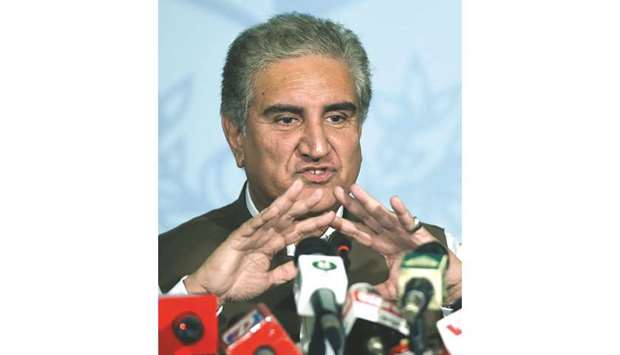Foreign Minister Shah Mahmood Qureshi has reiterated that Pakistan would not become a party to any regional conflict, and continue to support negotiated settlement of all regional disputes.
“Conflicts are not in favour of any country and dialogue is only viable option to bring peace and stability to the region,” he said while addressing a two-day seminar on Global Strategic Threats and Response, organised by the Centre for Aerospace and Security Studies (CAAS).
Air Chief Marshal Mujahid Anwar Khan, the chief of the air staff, was also present on the occasion.
Qureshi said that Pakistan is a peace-loving nation and wants to forge peaceful relations with all its neighbours, including India and Afghanistan.
“Pakistan remains committed to its core objective of lowering tensions and promoting peace and stability in the region,” he said.
Talking about landmark peace accord inked in Doha, he said that the agreement vindicated Prime Minister Imran Khan’s long-held narrative that there is no military solution to the Afghan conflict, and that only a politically-negotiated settlement can promote peace in the war-torn country.
Referring to the alleged Indian aggression, Qureshi regretted that unilateral and illegal actions taken by the Bharatiya Janata Party (BJP)-led regime in the Indian-administered Kashmir had endangered regional peace and stability.
He said that the recent violence spree in New Delhi had exposed anti-Muslims and Hindutva ideology of the BJP government.
Qureshi observed that due to India’s “intolerant” attitude towards minorities, the country is facing international scrutiny like never before.
“The world is seeing ‘incredible India’ as an ‘intolerant India’, and ‘shining India’ as a ‘burning India’,” he said.
The minister pointed out that the “game” of 2002 Gujrat riots was being repeated on streets of the Indian capital, which is a matter of serious concern for Pakistan and the entire international community.
“The concept of Hindutva, and what is happening in New Delhi, is a threat to peace in the region and the whole world,” he said.
Qureshi recalled that Pakistan’s forces responded to Indian aggression with bravery and strength in February last year.
“We also did not want to indulge in any conflict with India, but always exposed their designs and never followed the appeasement policy,” the foreign minister said.
He said that as Pakistan is extending full support to voice of Kashmiris, the world’s opinion is also turning in their favour and against the Indian rulers.
Qureshi said that Islamabad opened the Kartarpur Corridor to allow Sikh pilgrims to visit their religious holy site, and this peace initiative received recognition at the international level.
Earlier, in the first session of the day, Air Vice-Marshal (retired) Faaiz Amir spoke about The Role of Aerospace Power in South Asia, while Lieutenant-General (retired) Aamir Riaz, the former National Defence University president, gave a comprehensive presentation on Hybrid Warfare.
Jorge Sebastiao, the Huawei Middle East and European Union chief technology officer, covered various aspects of cyber-warfare.
In the second session of the day, Lieutenant-General (retired) Nasser Khan Janjua, the former national security adviser, spoke about Force Posturing for the Future, while General (retired) Philippe Steininger, the military adviser to the president of the CNES (the French space agency), spoke on the topic of Force Posturing for Industrially Independent and Dependent Countries.
Air Commodore Simon Edwards, the assistant chief of staff (Capability Delivery) at the UK Royal Air Force, spoke of the various aspects of Next Generation Training, whereas Pakistan’s Air Marshal (retired) Javaid Ahmed, the Air University vice-chancellor, highlighted the Role of the Pakistan Air Force in Sustaining Deterrence.
Fifteen renowned scholars, including nine international experts, from diverse backgrounds delivered lectures on different topics.
The main objective of the seminar is to create a comprehensive global forum seeking experts’ inputs and providing perspectives on changing balance of power, emerging technologies, aerospace employment, and new modes of warfare.

Qureshi: Conflicts are not in favour of any country, and dialogue is only viable option to bring peace and stability to the region.
